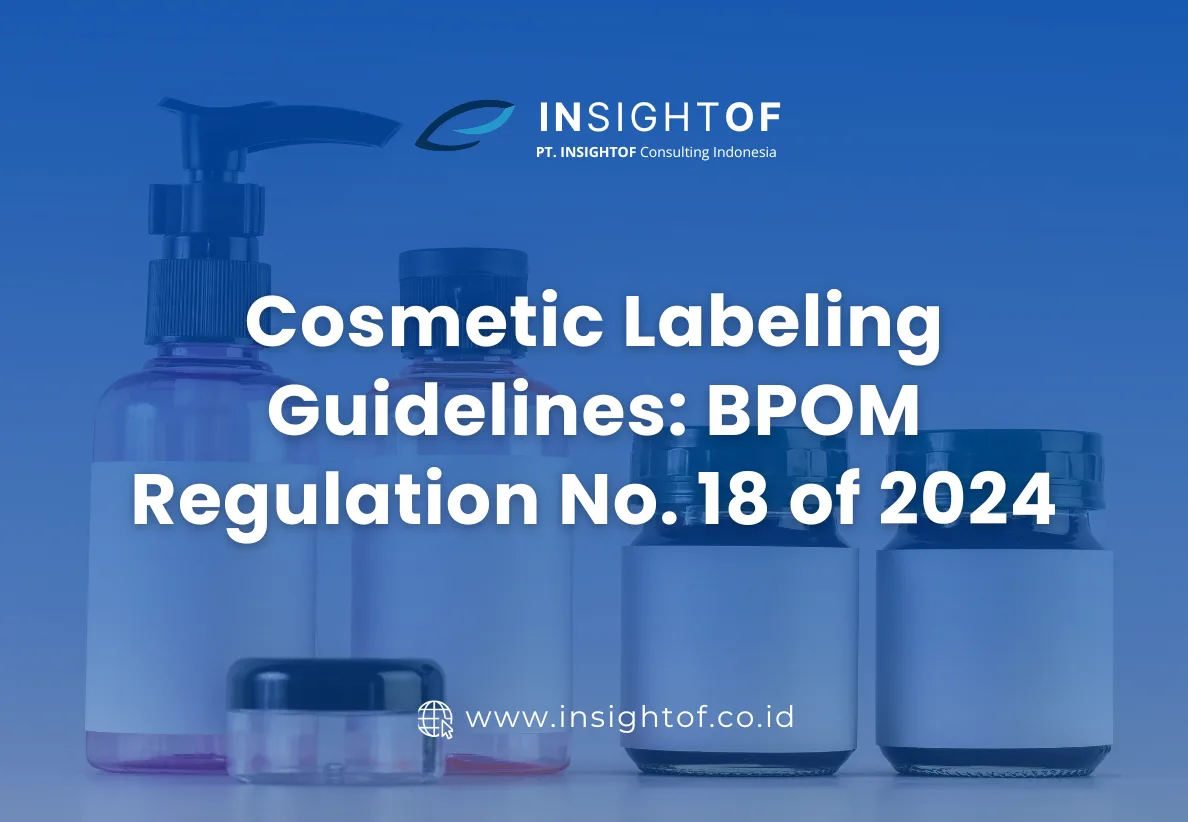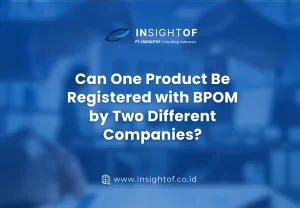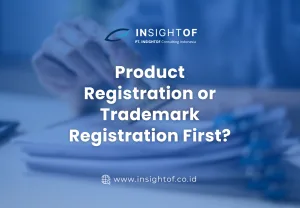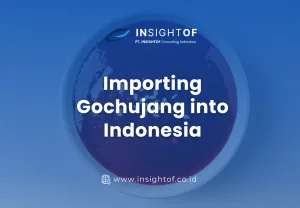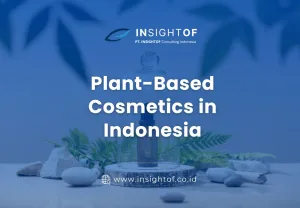Since 2011, Indonesia has adopted a cosmetic notification system as a commitment to harmonizing regulations within ASEAN. As a consequence of this notification mechanism, the Food and Drug Monitoring Agency (BPOM) no longer conducts comprehensive pre-market evaluations as was done under the previous registration mechanism. Manufacturers are now required to conduct self-assessments of their products, including the completeness of labeling. The latest BPOM Regulation No. 18 of 2024 provides more detailed guidelines regarding cosmetics, advertising, and labeling, while also revising parts of previous regulations.
Guidelines for Cosmetic Labeling
a. Product Name
The product name is a combination of the brand name and the specific product name, as stated in the submitted notification.

b. Benefits/Uses
The benefits/uses must be stated in Indonesian on the labeling, except for cosmetics where the benefits/uses are already clear from the product name or appearance, such as lipstick, powder, toothpaste, body soap, shampoo, perfume, etc.
Examples of cosmetics required to state the benefits/uses:

c. Usage Instructions
Usage instructions must be written in Indonesian on the labeling, except for cosmetics where the usage is already evident from the product name or appearance, such as lipstick, powder, body soap, shampoo, perfume, and others.
The usage instructions on the labeling of imported cosmetics must be written in Indonesian and have the same meaning as the language used on the labeling from the country of origin.
Examples of cosmetics required to include usage instructions:

d. Composition
The composition listed on the labeling must comply with the following requirements:
- It must match the formula stated in the cosmetic notification data.
- Use the name of cosmetic ingredients according to the International Nomenclature of Cosmetic Ingredients (INCI). If a cosmetic ingredient does not have an INCI name, another internationally recognized reference name may be used.
- Use the genus and species names for cosmetic ingredients derived from plants or plant extracts.
- Example: Pyrus Malus Juice, Camellia Sinensis Oil, etc.
- List the ingredients in descending order by concentration, except for ingredients with concentrations of less than 1% and/or colorants, which can be listed in no particular order after ingredients with concentrations above 1%.
- Colorants must be listed using the color index (CI) number or the colorant name for those without a CI number.
- Fragrances or aromatic ingredients may be labeled as “parfum,” “perfume,” “fragrance,” “aroma,” or “flavor.”
- Decorative cosmetics containing multiple color variants can use the terms “may contain,” “dapat mengandung,” or “+/-” on the labeling.
- Cosmetics containing nanomaterials must list the ingredient name followed by “nano” in parentheses.
- Example: Titanium dioxide (nano).

e. Country of Manufacturer
Cosmetics must indicate the country of manufacture.
Examples:
- Produced in Indonesia
- Made in Germany
For cosmetics produced by multiple production facilities within Indonesia under a single notification number, the name of the manufacturer and city must be listed according to the location of each facility. If the production facilities have different names and/or locations, the information can be included on one package using distinguishing marks, batch numbers with explanations, and/or other identifiers, provided that the explanations are included on the labeling.
Example:
- Notification number owner: PT. CITA
- Manufacturers: PT. CITA and PT. ANITA
Labeling options:
- Using a mark
- PT. CITA, Mawar No. 23B Jakarta – Indonesia
Produced by:
- PT. CITA, Mawar No. 23B Jakarta – Indonesia
- Using a batch number distinction
- PT. CITA, Mawar No. 23B Jakarta – Indonesia
Produced by:
PT. CITA – Jakarta (Batch code ending in number 2)
PT. ANITA – Solo (Batch code ending in letter G)
- PT. CITA, Mawar No. 23B Jakarta – Indonesia
f. Name and Complete Address of the Notification Number Holder
The name and address of the notification number holder must be fully stated on the labeling and must match the name and address listed in the notification acknowledgment letter.Domestic cosmetics may include the complete address of the notification number holder in the form of the factory’s full address. This does not apply to contract cosmetics and imported cosmetics.
Examples of name and address inclusion for notification number holders:
a) Domestic cosmetics
- Notification Number Holder:
- PT. CITA, with the address Jl. Mawar No. 23B, Jakarta, Indonesia.
- Cosmetic Industry: PT. CITA, with the address Jl. Mawar No. 23B, Jakarta, Indonesia.
Example of labeling:
PT. CITA, Jl. Mawar No. 23B, Jakarta, Indonesia.
- Notification Number Holder:
- PT. CITA, with the address Jl. Melati No. 1, Jakarta, Indonesia.
- Cosmetic Industry: PT. CITA, with the address Jl. Mawar No. 23B, Jakarta, Indonesia.
Example of labeling:
PT. CITA, Jl. Mawar No. 23B, Jakarta, Indonesia.
b) Imported cosmetics
- Notification Number Holder: PT. CITA, with the address Jl. Mawar No. 23B, Jakarta, Indonesia.
- Cosmetic Industry: HECOSM Inc, Malaysia.
Example of labeling:
PT. CITA, Jl. Mawar No. 23B, Jakarta, Indonesia.
Made in Malaysia.
c) Contract cosmetics
- Notification Number Holder: PT. CITA, with the address Jl. Mawar No. 23B, Jakarta, Indonesia.
- Cosmetic Industry: PT. ANITA, Semarang, Indonesia.
Example of labeling:
PT. CITA, Jl. Mawar No. 23B, Jakarta, Indonesia.
Produced in Indonesia.
g. Batch Number
The batch number is a number and/or letter or a combination of both that identifies the complete production history of a batch, including quality control and distribution. The batch numbering system should be specific.
h. Size, Volume, or Net Weight
The size, volume, or net weight must be included on the labeling and written in a location that is easy to read. The size, volume, or net weight stated on the labeling must match the cosmetic notification data.
| Writing size, volume, or net weight using: | Example |
| Metric unit | 50 liters or 50 L 100 milliliters or 100 mL 10 milligrams or 10 mg 20 grams or 20 g 2 kilograms or 2 kg |
| Imperial unit with metric unit | 1 fl Oz – 30 mL 1 fl Oz/30 mL |
i. Expiration Date
The expiration date is written starting with the words “expiration date” or “best used before,” or other commonly used terms in English such as “exp,” “exp. date,” “best before,” “expired date,” etc.
The expiration date should be written in the order of:
- Day, month, and year; or
- Month and year.
Examples:
Expiration date 13-12-2019, exp 041119, or best before 1118.
j. Notification Number
Cosmetics that have been notified will receive a notification number, which is listed on the notification letter.
The notification number consists of 2 letters and 11 digits, in the form of NX12345678901, where: X = A/B/C/D/E.
Cosmetic kits that have been notified will receive a notification number listed on the notification letter for combination/product kits. The notification number for cosmetic kits consists of 4 letters and 9 digits, in the form of NKIT123456789.

The information on the cosmetic kit packaging must comply with the following provisions:
a. The notification number on the packaging must be the cosmetic kit’s notification number.
b. The 2D barcode on the packaging must correspond to the cosmetic kit’s notification number.
c. The packaging must display an image and/or information explaining the position of each cosmetic in the kit.
d. The expiration date on the packaging must reflect the earliest expiration date of any of the cosmetics in the kit.
k. 2D Barcode
A 2D barcode is a graphical representation of digital data in a two-dimensional format with high decoding capacity that can be read by optical devices used for identification, tracking, and tracing. The use of 2D barcodes is governed by the regulations of the Food and Drug Monitoring Agency (BPOM) concerning the application of 2D barcodes in the supervision of drugs and food products.

l. Warnings and/or Cautions
Warnings and/or cautions, along with other information, must be clearly printed, easy to read, and proportionate to the size of the cosmetic labeling, including the following:
- Warnings according to the applicable laws and regulations;
- Warnings for aerosol products in a box, formatted as follows:
“Caution! Avoid contact with eyes and do not inhale.”
“Warning! High-pressure content, can explode at temperatures above 50°C, do not puncture, do not store in hot places or near flames, and do not dispose of in waste incineration.” - Warnings for mouthwash products containing fluoride or alcohol, with the following text:
“Not for use by children under 6 years of age.” - Warnings for cosmetics in ampule and/or vial packaging, with the following text:
“For external use only and not for injection.”

